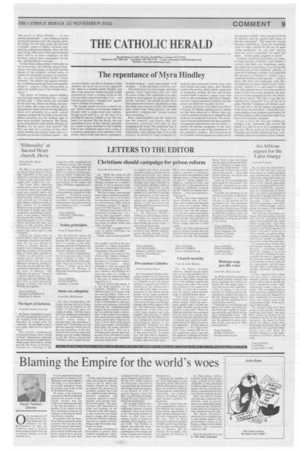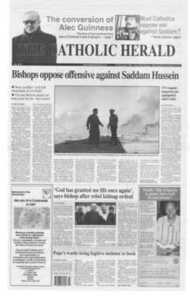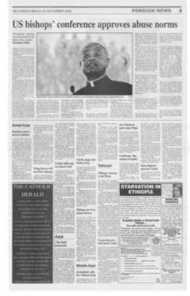Page 9, 22nd November 2002
Page 9

Report an error
Noticed an error on this page?If you've noticed an error in this article please click here to report it.
Tags
Share
Related articles
Playing With The Fires Of Nationalism
Why We Should Fear The Aftermath Of Victory
A Hidden Thread
English Is Ory's Catholic Future
Fighting Battles We Can Win
Blaming the Empire for the world's woes
David Twiston Davies
0 ne consequence of having been sidelined politically for centuries by the Reformation is that we Catholics tend to dismiss many matters which come up in national debate, as of no concern to us. It is an argument advanced periodically in relation to the Monarchy; and some Catholics will apply it to Jack Straw's recent glib attempt to blame the present woes of the world on the British Empire.
Of course, it has long been maintained thatProtestantism nurtured the growth of capitalism, though why the evidence of international trade in the Old Testament or the parable of the talents in the New should have been lost on Catholics following the break with Rome is unclear.
If Catholics did not flourish in Britain during the penal centuries, this was due to the restrictions placed upon them. Exclusion from government posts and the professions and being subjected to special heavy taxation all took their toll.
Unlike some Protestant and other non-Catholic theorists (such as one K. Marx) the Catholic Church has always recognised the necessity of economic growth; but it has also emphasised that relations between employer and employee depend on honest bargains with genuine benefits to both parties. The many Jacobites who flourished in trade and banking on the Continent in the 18th century, as they waited for the Stuart kings to regain their throne, proved that British Catholics were just as capable of flourishing as their Protestant countrymen at home.
The growing reluctance of Protestants to pursue their Catholic neighbours rigorously and the drift towards acceptance of the case for religious toleration, had an effect; but the first visible crack in the Protestant constitution occurred when the French lost their North American colonies to the British in 1763. It quickly became clear that there was little hope of turning George new subjects into Protestant Englishmen.
The existing Catholic hierarchy of New France was sufficiently nervous of those tendencies, which were to lead to the French Revolution at home, to offer their new masters loyalty in return for retaining their language, law and faith. The Bishop of Quebec was officially recognised and others sees were constituted in Nova Scotia and Upper Canada (now Ontario) for the first time since the Reformation.
Following the abolition of the Irish Parliament at the beginning of the 19th century and the subsequent failure to grant the promised Catholic Emancipation immediately afterwards, the Catholic subjects of Ireland increasingly became a problem for the Crown.
But many of the Irish who later emigrated drew a distinction between the injustice at home and the opportunities to build colonies in Queen Victoria's new dominions beyond the seas. Two of those involved in the Irish troubles of 1848 were D'Arcy McGee, who became a leading politician in Quebec, and Sir Charles Gavan Duffy, who was premier of Victoria in Australia. In 20th-century Africa, Catholic clergy were increasingly critical of the white oligarchies as they attempted to retain control over governments; but the missionaries always remembered that they were there to help the people.
Since the end of colonial rule they have continued their mission, often in circumstances of considerable danger, as in present day Zimbabwe. In this they are continuing in roles inherited from the past.
The Home Secretary's dismissal of our Imperial past is just another plank in this government's attack on all history, a subject which British Catholics have particular reason to heed.
David Twiston Davies works for The Daily Telegraph
blog comments powered by Disqus















